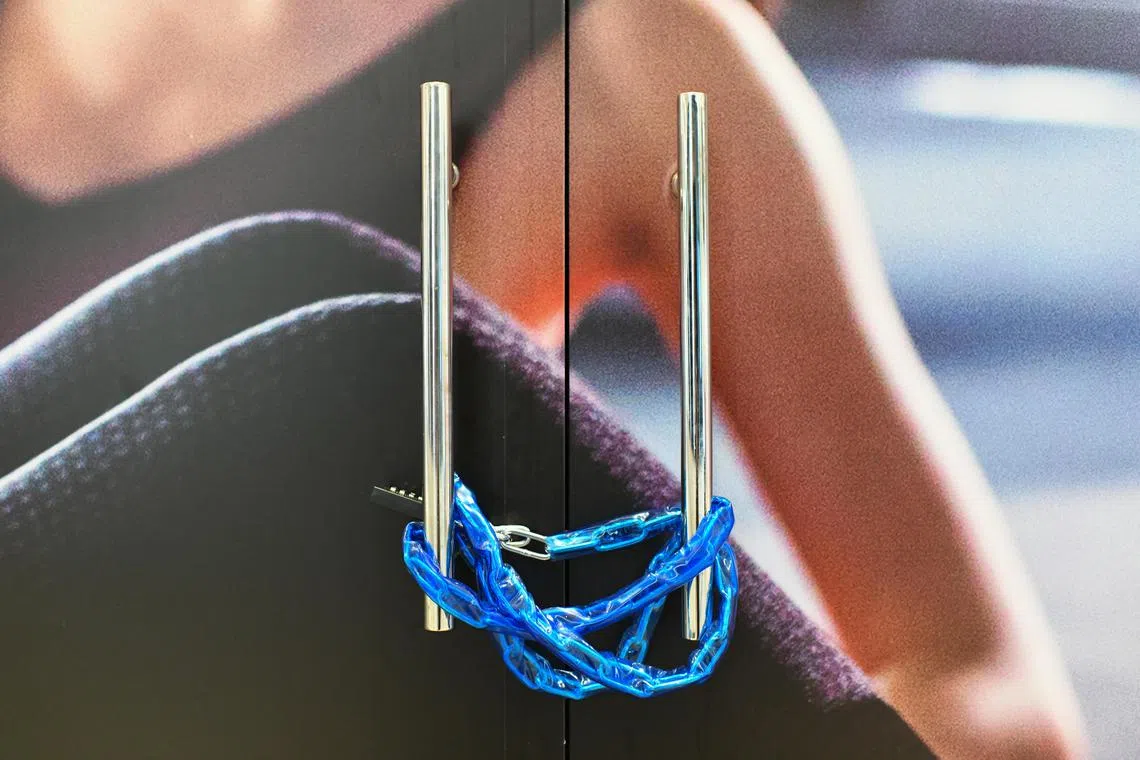Eyeing a gym package with upfront payment? Make sure you are protected, says consumer watchdog
Sign up now: Get ST's newsletters delivered to your inbox

Customers should check if their membership contract has a clear exit clause about what happens to the deposit if the gym closes.
ST PHOTO: SHINTARO TAY
SINGAPORE - Consumers lost more than $20,000 in advance payments for gym and fitness club packages in the first six months of 2023, said the Consumers Association of Singapore (Case).
That brings into focus the need for people to ensure they take steps to protect themselves when asked for upfront payment, said Case president Melvin Yong.
In response to queries from The Straits Times, Mr Yong said the consumer watchdog had previously called on the Government to mandate prepayment protection in sectors like the fitness industry to better safeguard the hard-earned money of consumers.
However, consumers too must protect themselves by ensuring they carefully consider their needs before they sign membership packages or personal training agreements with gyms or fitness centres, he added.
The issue is back in the spotlight with the abrupt closure of Fenix Fitness on Aug 14, a personal training gym operated by Gym Alliance.
It is the third gym to shut in 2023 after Haus Athletics and UFC Gym, both of which suddenly closed
Mr Yong, who is Radin Mas MP, said that the amounts in prepayment losses – the remaining balance of membership packages following gym closures – were based on complaints received by Case.
In a written reply to a parliamentary question in July, Trade and Industry Minister Gan Kim Yong said the Government’s approach has been to help consumers make informed decisions and manage prepayment risks.
Mr Gan also said the beauty sector is the one with the highest amounts of prepayment losses reported to Case from 2020 to 2022.
He added that businesses that are CaseTrust-accredited in some sectors offer prepayment protection that enables consumers to claim back the remaining balance if the business closes.
However, businesses in the fitness industry, including Fenix Fitness, do not fall under that scheme, said Mr Yong.
Consumers can enjoy savings per use over time for longer-term memberships, but they should consider shorter-term memberships or pay-per-use options, as it is generally challenging to recover their monies for prepaid memberships in a sudden business closure, he added.
Also, when a person engages in longer-term memberships, he is taking a credit risk on the financial strength of the company, said Withers KhattarWong partner Chenthil Kumarasingam, who specialises in dispute resolution.
He said: “Just because the gym is a well-known brand does not mean that the corporate entity you are contracting with (which may be a franchisee) is financially strong.”
To safeguard themselves, customers should research the gym’s reputation before joining, and look for any news relating to its financial stability, Mr Kumarasingam said.
He added that customers should check if their membership contract has a clear exit clause or provision about what happens to the deposit or advance payment if the gym closes or goes into liquidation.
If a gym closes overnight before one’s contract has ended, lawyer Amolat Singh, managing partner of Amolat and Partners, said consumers could file a claim at the Small Claims Tribunals (SCT), or start a civil claim in the State Courts – albeit a longer process, but recent changes to the procedure have expedited it.
If an order or judgment is obtained from either the SCT or the State Courts, the claimant would have to take the necessary steps to execute the judgment in order to get what they are owed, Mr Singh said. He added that this might involve seizing the goods or property of the gym and selling it, or freezing the bank account.
However, if the gym has gone bankrupt, chances are the consumers may not see their money, he said.
“One has to make a judgment call to drop the claim as a bad dream or throw good money chasing bad money, since time, effort and money would have to be expended in pursuing a claim,” he added.
Mr Kumarasingam said consumers should also start gathering essential documentation such as contracts, payment receipts and gym-related communication.
He added that they should also reach out to the gym’s management or liquidator to explore potential refund options, and lodge a complaint with consumer protection authorities.
However, consumers should be mindful that as unsecured creditors, reimbursement prospects may be limited in comparison to secured creditors like banks and landlords, Mr Kumarasingam said.
Most gyms raise funds and capital by offering attractive packages with a “win-win” objective, where the consumer enjoys benefits or discounts and the gym gets the funds it needs for its expansion, buying new equipment and upgrading, said Mr Singh.
He added that this is an alternative to borrowing from the bank, as gyms would have to pay interest, or may not even be given the loan if the gym is too new and has no track record.
Some have suggested the money paid to the gym by customers be held by a third party, and disbursements be made only upon the gym showing its concrete plans, said Mr Singh.
“Understandably, this would entail additional administrative costs that the consumer would end up bearing indirectly,” he added.
Another solution would be regulations on when prepayments can be obtained and how they can be drawn down, with the remainder of fees held in designated accounts that consumers have priority over, said Mr Kumarasingam.
Compulsory insurance covering prepayments is another option, he added, ensuring that consumers can get refunds even if the gym closes.
“Similarly, other things being equal, consumers will ultimately have to bear the cost of this insurance,” he said.



